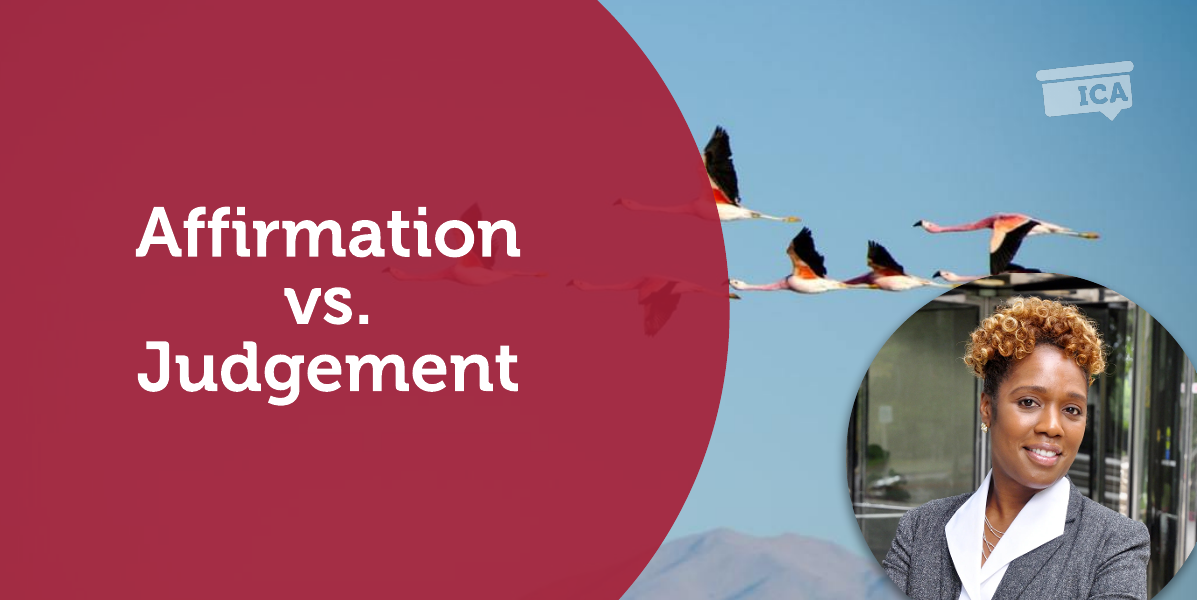
A Coaching Power Tool Created by Rakael Carr
(Leadership/Financial Coach, UNITED STATES)
Learn to experience yourself without judging yourself Bryant MCGill
It’s the repetition of affirmations that leads to belief. And once that belief becomes a deep conviction, things begin to happen. Muhammad Ali
If we were birds, affirmations would be the wind beneath our wings, providing us with the confidence to soar higher and if need be flap harder. Meanwhile, judgement would be our nemesis. It is as lethal to us as oil is to birds. It is one of our greatest threats, it causes destructive thinking and it paralyzes our ability to realize our dreams and pursue our passions with confidence. Researchers agree, positive affirmations increase confidence and improve overall success.
Whether we affirm ourselves or judge ourselves is dependent on our beliefs. Determining if our beliefs support or sabotage our goals will help us change what we tell ourselves. We cannot swim in oil if we want to fly with eagles. Affirmations without beliefs are empty words without purpose. Affirmations must be rooted in love, appreciation, and kindness if they are going to propel us forward and give us the strength combat negative judgmental thinking.
The root cause of all judgment is the fear of not being good enough, not being worthy of love, and not being safe. When we become brave enough to look at the judgment and fear, we can begin to heal. Gabby Bernstein
Beliefs:
As humans, we develop confirmation biases that determine what we believe to be true.Dr. Lickerman from Psychology Today states confirmation biases causes us to pay more attention and give more credence to thoughts or ideas that support our beliefs or our core values. Meaning, “we tend to cherry-pick evidence that supports a contention we already believe and ignore evidence that argues against it.” To reframe our perspective we should explore the underlying beliefs that caused judgment to be our source of truth.
Judgment
It is difficult to argue against thoughts or ideas that have been ingrained since childhood. Knowing what our confirmation biases are will give us the power to fight against them by taking the time to evaluate all available evidence. If we take a moment to reflect, we could probably point to many instances where we ignored valid evidence and cherry-picked certain information based on what we felt at the time.
For instance, if we always believe we could have “done better” we will always look for flaws in every outcome and nothing will ever meet our standards. If we believe no one loves us, we will look for rejection even when there is acceptance. Our confirmation biases will only confirm our beliefs and ignore everything else. Overcoming a core belief requires acknowledgement and action. We have to acknowledge our value and determine new ways to support that belief.
Judgement plays a strong role in our self-esteem and self-image. The source of judgement can present differently depending on our values. There are two major points at opposite ends of the judgmental spectrum. While both are destructive and paralyzing, the outcomes vary depending on the individual.
Individuals with judgmental thinking and high self-esteem often have unattainable expectations and value perfection above all else. Their constant desire to reach unattainable goals causes pervasive dissatisfaction. High self-esteem individuals search for imperfections in themselves and others and have little value in pointing out success if they perceive points failure are present.
Individuals with judgmental thinking and low self-esteem often feel unworthy and have hypersensitivity towards rejection. Low self-esteem individuals search for rejection and incompetence.
When perfection or rejection are the measurements by which we place our value, we will reject other pertinent information that would allow us to affirm or appreciate ourselves. Imperfections and rejections are always present and so are opportunities for appreciation and gratitude.
Reframing Perspective
According to Merriam-Webster, appreciation is the feeling or expression of admiration, approval, or gratitude. Appreciation gives us permission to approve and affirm ourselves and others rather than criticizing and judging.
Our lives are either enriched by our beliefs or diminished by our biases.
If we believe everything must be perfect we will look for imperfection.
If we believe we do not have value we will search for rejection.
We can reframe our perspectives to believe that we are perfectly imperfect and life is to be experienced and we are to be valued. It requires acknowledgment and acceptance of imperfections and rejections. If we appreciate our imperfections they will no longer become points of fault but rather a part of the process. We could show gratitude for the experience rather than reaching for what could have or would have happened. Some of the best artist and inventors were rejected. Rejection is a part of the process, it does not define our value. We have the power to determine our value by affirming and appreciating ourselves.
Consider this:
We are similar to a tree. It takes decades for a tree to grow strong roots and withstand the elements. Trees need strong roots to hold up their tall frames. Our thinking is similar, as it has taken decades for those roots to develop to form who we are today.
Judgment Tree
Our beliefs are the roots, judgmental thoughts are our trunks, criticism is our branches, discouragement, self-doubt, and discontent, are our fruits.
A judgmental tree cannot produce positive thoughts. Positive affirmations on a judgmental tree are merely decorations that will wither over time. If affirmations are to be truly effective they must come from the heart. When they come from within, we are able to pull on them at any time and will not need to rely on mantras or scripted text. They will be readily available in times of heartache and failure, rejection and pain.
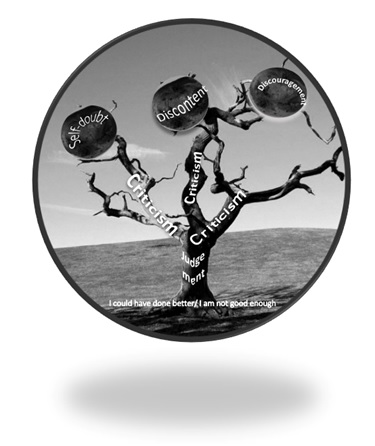
Affirmative Tree
Uprooting our old ways of thinking will allow us to plant new beliefs that will govern our thoughts and motivate our actions. One where the root is love and the trunk is appreciation. When we genuinely love and appreciate ourselves, affirmations will grow from our tree and we will produce fruits of confidence, lightness, and power, that will propel us into action.
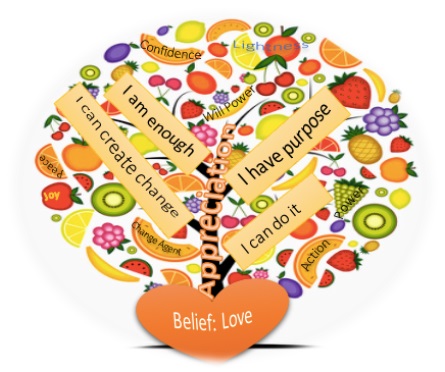
Case Study:
Naomi was asked to speak at an event to empower and encourage individuals that had gone through major setbacks in their lives. She leapt at the opportunity to tell her story of the perils of misfortune to the road to success. She worked on her speech for months visualizing the audience’s responses and her cleaver reactions.
As the event grew closer, Naomi began to doubt if her story was good enough and if it would add value to the audience. As she envisioned the event, she began to think of all the ways the event would go wrong. She eventually talked herself out of going because of extreme doubt and self-degradation.
She judged herself and her lack of experience giving speeches, that doubt grew into fear and anxiety. Traits she didn’t often experience primarily because she rarely took a risk or engaged in anything she couldn’t predict a high probability of success. Since this event was new and she didn’t have a great deal of experience she allowed fear, doubt, and criticism to consume her thoughts.
The event coordinator stressed the importance of her participation as the flyers and communication had already been distributed. Reluctantly, Naomi decided she would keep her commitment. She remembered she invited several people and she didn’t want to disappoint her supporters.
Naomi was one of 8 speakers at the event. The week before the event, the coordinator informed her she was in the 7th position. Naomi became concerned no one would be left after listening to the 6 speakers prior to her appearance. She continued to judge herself and the event. When she arrived everything she feared became a reality. Many attendees left after the prior speakers finished. She delivered her speech to the remaining participants and everyone praised her speech and thanked her for her contribution as it resonated with some of the struggles they experienced.
She could not enjoy the moment of sharing her story because of the judgement she placed on herself and on the event. She did not believe the accolades as the event did not meet her expectations. She focused on everything she did wrong and was unable to appreciate the things that went well. It paralyzed her and she refused to pursue future engagements. Naomi was later asked to speak at another event from one of the participants. She decided to reevaluate the previous event and look at it from a positive perspective to plan for the next engagement.
Self-Application
Judgement and criticism
In the above example, Naomi’s confirmation bias caused her to look for imperfections and points of failure instead of success.
Had Naomi believed everything would work out for the best, she would have met the event with appreciation. She would have evaluated the engagement from a positive and affirming lens. That new perspective would have provided her with the opportunity to possibly enjoy the experience.
When was the last time you judged yourself?
Do you look for points of failure instead of points of success?
Are you a fault finder?
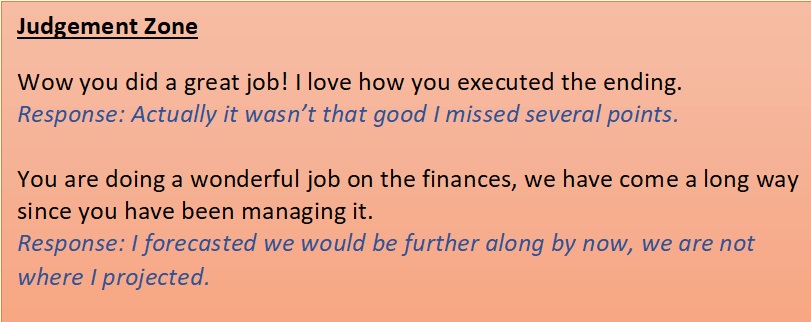
The judgement leaves us defeated and casts a disapproving shadow. It creates a heaviness that holds us back from fully experiencing ourselves.
Judgement + Criticism = Self Doubt + Paralysis
Appreciation + Affirmation = Belief + Action
Appreciation and Affirmation
Appreciating yourself gives you permission to love yourself, allows you to affirm yourself, and gives you the freedom to be yourself.
Admittedly, it is challenging to commit to daily affirmations. They are usually scripted and require daily mantras. They are designed to “say it until you believe it!”That is a difficult task if the mantras are truly the opposite of what you believe. Appreciation, however, is salt that gives affirmations its flavour, it is the precursor to believing and moving into positive action.
When they come from within and are rooted in appreciation, affirmations become a way of life rather than a mantra. They create a lightness you need and deserve to easily move forward.
You deserve to appreciate yourself even in the midst of failure. You deserve to love yourself even in times of rejection and heartbreak.
When you take a moment to enter into the “judgement-free zone” you move from judgment to appreciation almost immediately. Affirmations become not only easy to say but easy to believe because they come from within.
The “Judgement Free Zone” is a simple way to change your beliefs and give deeper meaning to your affirmations that will undoubtedly allow you to move forward into action.
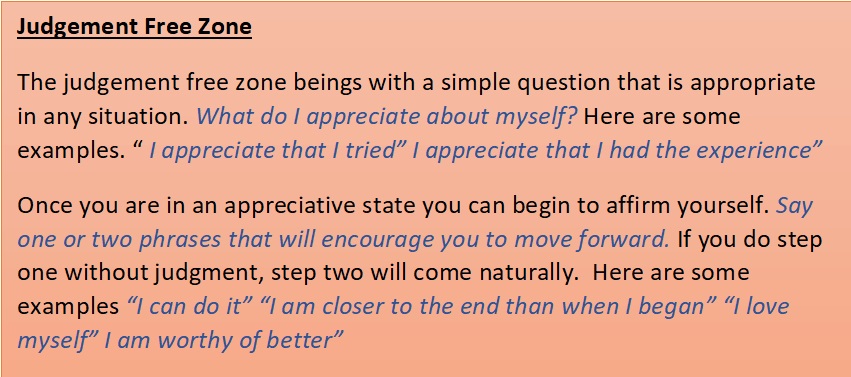
Coaching Application
Affirmation and appreciation propel clients forward into action. It is difficult for someone to move from judgement to positive affirmations. Affirmations even if repeated daily are empty words if they are not rooted in love and appreciation.
Challenge your client to establish “judgement free zones” where they can spend the first moments of any situation to enter into an appreciative state then follow with positive affirmations rather than judgement and criticism.
References
https://www.psychologytoday.com/us/blog/happiness-in-world/201104/the-two-kinds-belief
https://journals.sagepub.com/doi/abs/10.1177/0146167215577365